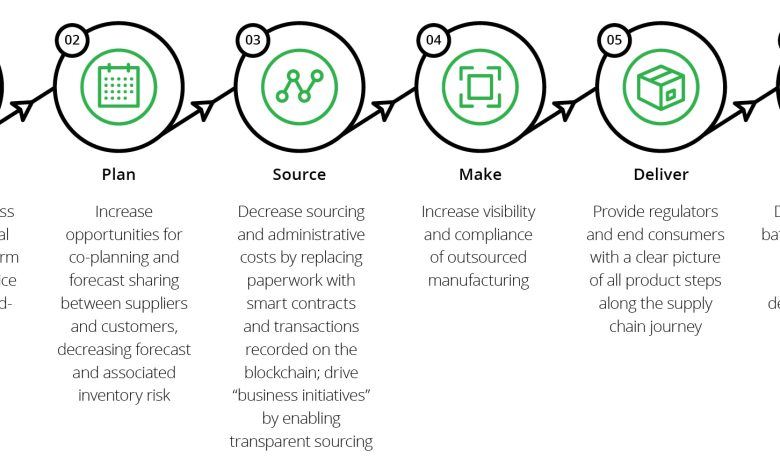How Blockchain Can Enhance Supply Chain Transparency

- Understanding the Basics of Blockchain Technology
- The Role of Smart Contracts in Supply Chain Management
- Benefits of Implementing Blockchain in Supply Chain Processes
- Challenges and Limitations of Blockchain Adoption in Supply Chains
- Real-world Examples of Blockchain Improving Transparency in Supply Chains
- Future Trends and Opportunities for Blockchain in Supply Chain Management
Understanding the Basics of Blockchain Technology
Blockchain technology is a decentralized, distributed ledger system that records transactions across a network of computers. Each transaction is stored in a “block” that is linked to the previous block, forming a chain of blocks – hence the name “blockchain.” This technology ensures transparency and security by making it nearly impossible to alter or delete information once it has been recorded.
One of the key features of blockchain technology is its transparency. All participants in the network have access to the same information, which is updated in real-time. This transparency helps to build trust among stakeholders and reduces the risk of fraud or errors in the supply chain.
Another important aspect of blockchain technology is its immutability. Once a transaction is recorded on the blockchain, it cannot be changed or deleted. This feature ensures the integrity of the data and provides a reliable audit trail for all transactions within the supply chain.
Blockchain technology also offers increased security through cryptography. Each block in the chain is encrypted, making it extremely difficult for unauthorized parties to access or alter the information. This level of security helps to protect sensitive data and prevent cyber attacks on the supply chain.
Overall, understanding the basics of blockchain technology is essential for realizing its potential to enhance supply chain transparency. By leveraging the transparency, immutability, and security features of blockchain, businesses can improve efficiency, reduce costs, and build trust with customers and partners.
The Role of Smart Contracts in Supply Chain Management
Smart contracts play a crucial role in enhancing transparency in supply chain management through blockchain technology. These self-executing contracts are programmed to automatically facilitate, verify, or enforce the negotiation or performance of a contract, without the need for intermediaries. By utilizing smart contracts in supply chain management, companies can ensure greater efficiency, security, and trust in their transactions.
One of the key benefits of smart contracts in supply chain management is the ability to track and trace products at every stage of the supply chain. This level of transparency helps to prevent fraud, counterfeiting, and other unethical practices. Additionally, smart contracts can automate payments based on predefined conditions being met, reducing the risk of errors or delays in financial transactions.
Moreover, smart contracts can also help in streamlining the procurement process by automatically triggering orders when inventory levels reach a certain threshold. This not only improves inventory management but also reduces the likelihood of stockouts or overstocking. By leveraging smart contracts, companies can optimize their supply chain operations and minimize costs.
Benefits of Implementing Blockchain in Supply Chain Processes
Implementing blockchain technology in supply chain processes offers a multitude of benefits that can significantly enhance transparency and efficiency. One of the key advantages of utilizing blockchain is its ability to provide a secure and immutable record of transactions. This ensures that all parties involved in the supply chain have access to real-time data that is accurate and trustworthy.
Another benefit of blockchain in the supply chain is increased traceability. By utilizing blockchain, companies can track the movement of goods from the point of origin to the final destination. This level of traceability can help in identifying and resolving any issues or discrepancies that may arise during the transportation and delivery process.
Blockchain technology also promotes greater accountability within the supply chain. With all transactions being recorded on a decentralized ledger, it becomes easier to pinpoint any instances of fraud or unethical practices. This transparency can help in building trust among stakeholders and ensuring compliance with regulations and standards.
Furthermore, implementing blockchain can lead to cost savings for companies by streamlining processes and reducing the need for intermediaries. By eliminating unnecessary paperwork and manual processes, companies can achieve greater operational efficiency and reduce the risk of errors or delays in the supply chain.
Overall, the integration of blockchain technology in supply chain processes can revolutionize the way businesses operate by enhancing transparency, traceability, accountability, and cost-effectiveness. It is a powerful tool that can drive innovation and create a more secure and efficient supply chain ecosystem.
Challenges and Limitations of Blockchain Adoption in Supply Chains
Implementing blockchain technology in supply chains can significantly enhance transparency and traceability. However, there are challenges and limitations that need to be addressed for successful adoption:
- **Complexity**: The complexity of blockchain technology can be a barrier to adoption for some organizations. Understanding how blockchain works and integrating it into existing systems can be challenging.
- **Cost**: Implementing blockchain in supply chains can be costly, especially for small and medium-sized enterprises. The initial investment required for infrastructure and training can be a deterrent.
- **Scalability**: Blockchain networks can face scalability issues when dealing with a large number of transactions. This can impact the efficiency and speed of supply chain processes.
- **Interoperability**: Ensuring interoperability between different blockchain platforms and existing systems is crucial for seamless data sharing. Lack of standardization can hinder adoption.
- **Security**: While blockchain is known for its security features, it is not immune to cyber threats. Ensuring the security of data stored on the blockchain is essential for maintaining trust in the supply chain.
Despite these challenges, overcoming them can lead to significant benefits in terms of transparency, efficiency, and trust in the supply chain. Organizations that successfully adopt blockchain technology can gain a competitive advantage and build stronger relationships with stakeholders.
Real-world Examples of Blockchain Improving Transparency in Supply Chains
Blockchain technology has been instrumental in enhancing transparency in supply chains across various industries. Here are some real-world examples of how blockchain has improved transparency:
- **Food Safety:** In the food industry, blockchain has been used to track the journey of products from farm to table. By recording each step of the supply chain on a blockchain, consumers can easily access information about the origin of their food, ensuring its safety and quality.
- **Conflict Minerals:** Companies are using blockchain to trace the source of minerals used in their products to ensure they are not sourced from conflict zones. This transparency helps in promoting ethical practices and preventing the use of minerals that fund armed conflicts.
- **Pharmaceuticals:** Blockchain is being utilized in the pharmaceutical industry to track the distribution of drugs and verify their authenticity. This helps in reducing the circulation of counterfeit drugs and ensures that patients receive genuine medications.
- **Fashion Industry:** Fashion brands are leveraging blockchain to provide visibility into their supply chains, allowing consumers to verify the authenticity of products and ensure ethical manufacturing practices. This transparency helps in promoting sustainability and fair labor practices.
These examples demonstrate how blockchain technology is revolutionizing supply chain transparency by providing a secure and immutable record of transactions. By leveraging blockchain, companies can build trust with consumers, improve accountability, and drive positive change in various industries.
Future Trends and Opportunities for Blockchain in Supply Chain Management
The future of blockchain in supply chain management looks promising, with numerous trends and opportunities on the horizon. One key trend is the increasing adoption of blockchain technology by major players in the industry. Companies are recognizing the benefits of blockchain in enhancing transparency, traceability, and security throughout the supply chain.
Another trend is the integration of blockchain with other emerging technologies such as Internet of Things (IoT) and artificial intelligence (AI). This integration can further improve the efficiency and accuracy of supply chain processes, leading to cost savings and better decision-making.
Opportunities for blockchain in supply chain management include streamlining cross-border transactions, reducing fraud and counterfeiting, and improving sustainability practices. By leveraging blockchain, companies can create a more resilient and agile supply chain that can adapt to changing market conditions.
Overall, the future of blockchain in supply chain management is bright, with the potential to revolutionize the way goods are tracked, verified, and exchanged. As companies continue to explore and implement blockchain solutions, we can expect to see increased transparency, efficiency, and trust in supply chain operations.



